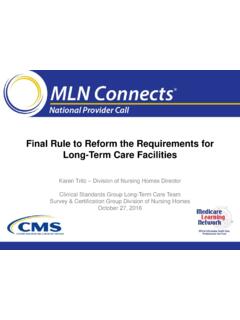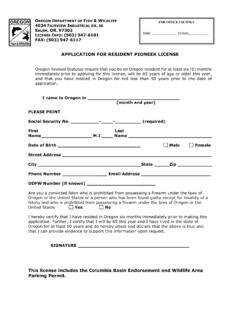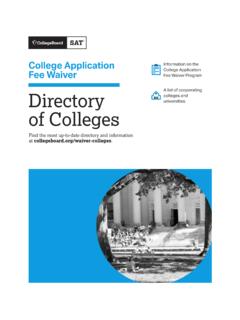Transcription of The Power of Language to Create Culture - Pioneer Network
1 1 The Power of Language to Create Culture Thank you to The Hulda B. and Maurice L. Rothschild Foundation of Chicago, Illinois for the generous funding that made this paper possible. Carmen Bowman, MHS Judah Ronch, PhD Galina Madjaroff, MA Dedication To the beautiful people who live and work in long term care. Let s Create a beautiful Language together. 2 Acknowledgements The three authors want to thank Dr. Robert Mayer, President of the Rothschild Foundation, whose support for this paper went far beyond the financial resources that supported its preparation. Rob was essentially our fourth collaborator. His dedication to the project and what it could mean to how elders experience life in our care settings started with the many events supported by the Rothschild Foundation that led up to the idea to prepare this paper. These include the Creating Home I Symposium (2008) on the environment and subsequent creation of the Life Safety Task Force, the Creating Home II Symposium (2010) on food and dining and the subsequent Clinical Food and Dining Standards Task Force and the many other Rothschild Regulatory Task Forces and projects that led to this next step in finding where the lives of elders could be changed by changing practices.
2 Rob got into the trenches of this work with us by reading each draft carefully and making countless insightful and pivotal suggestions about how to refine, focus, organize and otherwise maximize the impact of what we were trying to say. He was constantly vigilant about the requirement that if we were writing about Language , we had to practice what we preached, and made innumerable wise suggestions that helped us do that. He also made the wise suggestion that we ask a panel of experts to read the manuscript in draft form. Our thanks go to our dedicated reviewers: Maggie Calkins, IDEAS Institute; Peter Reed, Pioneer Network ; Karen Schoeneman, formerly of CMS, now Karen Schoeneman Consulting; Heidi Gil, Planetree; Ingrid Fraley, AIA Design for Aging Community, and: Carol Ende, Eden Alternative. Their enthusiasm for the topic, practical experience and expertise added immeasurably to the scope of the paper. Despite all that help, projects like this one are never perfect, and all errors are the responsibility of the authors.
3 3 Executive Summary Language plays a crucial role in shaping the Culture of aging and aging services in our society. The words we use when talking to and about older persons denote how they are valued, what is expected of them, and where they stand with respect to the speaker. Any serious and lasting attempt to change the Culture of aging services organizations must include an analysis of what is said, to whom and what that communication both denotes (says) and connotes (means at multiple levels). Learning from other fields, we have seen how words matter and can be sources of both good and harm. What a person is called creates expectations about their behavior and sets the limits on how much growth and individual identity is deemed possible by those who serve them. Our analysis of the traditional terms that have characterized speech in the aging services work place reveals culturally embedded ways of talking that infantilize, subordinate, marginalize and otherwise dishonor elders.
4 We present many examples of changed vocabularies that reflect the values of some of the new cultures developed to combat these tendencies. These cultures reflect new assumptions about elders and their roles in society, and as such replace dehumanizing Language with Language that communicates honor, inclusion, partnership and equality of elders and those who serve them. The impact of new Language is seen as a way of interacting that goes deeper into the core of peoples lived experience than mere changes in the words people speak. We argue that the new Language will have a positive effect on how elders feel about themselves, how they think, and how functionally able they can be in daily life. Words do indeed make worlds. We conclude that cultures of care that honor those who live and work in them will find that changing Culture and changing Language are complementary processes. 4 Preface Why Language ? 7 Judah Ronch, Galina Madjaroff A note to our readers 9 Introduction Where we are with Language 13 Carmen Bowman Learning from Other Fields Why words matter 16 Carmen Bowman Language , Customer Service and the Culture of the Nursing Home Workplace 25 Judah Ronch, Galina Madjaroff Language and the Maintenance of Self 29 Judah Ronch, Galina Madjaroff The Status of Language in Long Term Care 35 Carmen Bowman New Vocabularies 65 Carmen Bowman Metaphors and Experience: Words into Action 74 Judah Ronch, Galina Madjaroff Places, spaces and the Language of relationships 82 Judah Ronch, Galina Madjaroff What people are Saying about Language 85 Carmen Bowman Learning from those who have Changed Language 87 Saying what we believe and believing what we say.
5 91 The hard work to change Language 5 Judah Ronch, Galina Madjaroff References 96 Glossary of Terms 103 About the Rothschild Foundation 108 About the Authors 109 6 The greatest discovery of my generation is that human beings can alter their lives by altering their attitudes of mind. William James If thought corrupts Language , Language can also corrupt thought. George Orwell The difference between the right word and the almost right word is the difference between lightning and the lightning bug. Mark Twain Languages differ essentially in what they must convey and not what they may convey. Roman Jakobson, eminent linguist 7 Preface Judah Ronch and Galina Madjaroff Why Language ? The quotes on the front piece convey fundamental truths about how Language has Power . Language changes lives by changing minds, shaping thought, and making worlds of difference merely by what is said and not said.
6 It embodies the rules of a Culture and the aspirations of those who live in it. The Language we speak, hear, and read, and with which our minds ponder our place in the world, shapes our reality. Language is important both because of what it communicates and in how many ways it does it. It conveys the important rules about how we, and the others in our environment (seen and unseen), expect ourselves to go about our lives. The Power and impact of Language are really paradoxical in how Language can influence behavior. Consider these examples of how Language works and what Language can do: it can inform in a desired way, both by what it says and doesn t say ( You really look good vs. You look good for your age ), it can exert Power or control over someone else s actions and emotions even if they are not present (like when reading a history book or novel), it allows us to contact another person when they are not physically present at the same time and place such as by phone and Internet ( Skype and FaceTime) or in writing (on paper or through electrons, email and texting) and so Create closeness, cooperation or affiliation with one another.
7 But, it can also Create distance, opposition or isolation among people when they are physically together (like when someone uses jargon that marks identity in an in-group or someone who uses a different Language which you don t understand), it can bring great emotional pain ( name-calling or use of racial or sexual epithets), it can shatter a person s self-esteem, such as when someone personalizes the performance of another ( Your high error rate makes you totally useless ), it can do all these things, and more, both when we intend to and at times when we don t have the intention to because Language can operate outside of our conscious awareness and contrary to our conscious intent (like so-called Freudian slips of the tongue). So words really do matter. We can talk to, at, through, with, about, around and despite other people and events. The words we use, and how they convey our thoughts open our inner worlds of meaning to our audience, and so Create our world and the worlds of those Culture change in nursing homes is incomplete without Language change.
8 8 around us. Through this dynamic process of reciprocal influence what we say affects others and vice versa. Things can get very complex and confusing at times. We live immersed in a sea of Language that, despite our best intentions and well-developed brains, can Create either clear messages that say what we intend or can generate confusing noise. Because we produce speech at such a rapid rate, often without conscious thought, there are many times when we don t say what we mean, or wish we could take something harmful we said back because we didn t mean to say it, or say it quite that way. And sometimes, we think we are saying something that is not harmful but the listener feels injured nevertheless. Historically, traditional nursing homes have been places where people use a great deal of Language that might actually do harm. In their paper Words Matter, Ronch and Thomas (2009) examine the verbal and other communication we use, and point to where we can change the world of nursing homes.
9 A core component of any Culture , especially an organization s, is the Language it relies on to Create shared identity and communicate its values. The world being created by the common Language of the institutional nursing home in particular is not a world people are clamoring to live in. It s our belief that the Language of the traditional nursing home represents a Culture that needs changing. So we advocate for changed Language . An integral part of any cultural practice is the Language used to communicate it. 9 A note to our readers: Our research on Language led us to discover that there were a number of terms used in the literature for the kind of speech used with people living in nursing homes that we want to replace with person first Language . Culture change: defined by the Pioneer Network , the leading national organization of the Culture change movement is a transformation anchored in values and beliefs that return control to elders and those who work closest with them.
10 Its ultimate vision is to Create a Culture of aging that is life-affirming, satisfying, humane, and meaningful. Culture change can transform a facility into a home, a resident into a person, and a schedule into a choice.; These are changes not only in Language but more importantly in practice welcome, refreshing changes with profound impact on the lives of people living and working in what is commonly referred to as long term care. Person first Language . The disability community has developed what they call person first Language encouraging our Language to always speak about the person first. So instead of the Parkinson s resident we talk about Sam who has, or lives with, Parkinson s disease. Although you will read us report on what is called people first Language , we have known it longer as person first Language and feel it fits with the national Culture change movement better. The movement advocates for person centered care and person directed care and putting the person before the tasks is one of the core values chosen by the Pioneer Network , the leading national organization of the Culture change movement, to describe what needs to be done to change institutional Culture .









